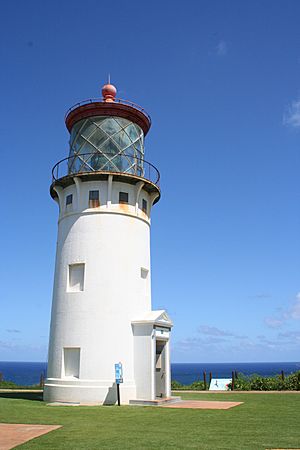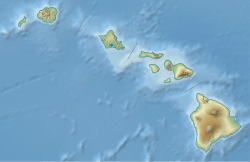Kilauea Light facts for kids
 |
|
| Kīlauea Lighthouse, 2008 | |
|
|
|
| Location | Kalihiwai Kauaʻi County Hawaii |
|---|---|
| Coordinates | 22°13′53.8″N 159°24′7.2″W / 22.231611°N 159.402000°W |
| Year first constructed | 1913 |
| Automated | mid-1970s |
| Deactivated | 1976-2013 |
| Construction | reinforced concrete tower |
| Tower shape | cylindrical tower with balcony and lantern |
| Markings / pattern | white tower, red lantern roof |
| Height | 52 feet (16 m) |
| Focal height | 174 feet (53 m) |
| Original lens | Second Order Fresnel, clamshell or "bivalve" shape |
| Range | 9 nautical miles (17 km; 10 mi) |
| Characteristic | Fl W 10s. |
| Admiralty number | G7500 |
| ARLHS number | HAW-004 |
| USCG number | 6-29737 |
The Kīlauea Lighthouse is a famous landmark in Hawaii. It stands tall on Kīlauea Point, a narrow piece of land sticking out into the ocean. You can find it on the island of Kauaʻi, inside the Kīlauea Point National Wildlife Refuge. This lighthouse has a long and interesting history, helping ships find their way for many years.
Contents
Building the Lighthouse
Getting Started
The land for Kīlauea Point was bought in 1909 for just one US dollar! This was a great deal for such an important spot. Building a lighthouse here was a big challenge. There were no good roads to bring supplies from the nearest harbor.
Bringing Supplies by Sea
Workers had to bring all the building materials by sea. A special ship called the Kukui would anchor offshore. Then, smaller boats would carry the supplies closer to the point. Since there was no beach, these boats had to tie up to special hooks in the lava rocks. A large crane, called a boom derrick, was built on a high ledge. It would lift the supplies from the boats, 110 feet (34 m) above the water, and place them on a platform.
Construction Begins
After almost four years of planning, construction finally began in July 1912. The lighthouse was finished and officially opened on May 1, 1913. It was built using strong reinforced concrete. The tower is shaped like a cylinder and stands about 52 feet (16 m) tall. At the top, there is a circular walkway with a handrail.
The Lighthouse Lens
A Special Lens
The Kīlauea Lighthouse has a very special lens. It is one of only seven "second-order Fresnel lenses" still in use in lighthouses in the United States. This amazing lens was made in Paris, France by a company called Barbier, Bernard, and Turenne.
How the Lens Worked
The lens was very heavy, weighing about 9,000-pound (4,100 kg). It floated on a pool of mercury and compressed air, which helped it turn smoothly. A system of pulleys powered by weights made the lens rotate. Lighthouse keepers had to reset these weights every 3.5 hours to keep the light spinning.
Life at the Lighthouse
Early Days
Near the lighthouse, there was a small building to store oil for the light. There was also an engine house in a small cove below the point. About 1,000 feet (300 m) away, there was a living area with three stone houses for the lighthouse keepers and their families. Each house and the lighthouse itself had its own water storage tank.
A Guiding Light
In 1927, the Kīlauea Lighthouse played a key role in history. Two brave pilots, Lester J. Maitland and Albert F. Hegenberger, were trying to fly across the Pacific Ocean for the first time. Their radio was not working, but they spotted the Kīlauea Lighthouse just before dawn. This helped them confirm their location and successfully complete their flight from California to Hawaii.
Modern Changes
In 1930, a radio beacon was added to the lighthouse. This allowed the light to be powered by electricity. The light became much brighter over time. In 1958, its power reached an amazing 2,500,000 candle power!
The lighthouse was staffed by keepers until 1974. In 1976, it became automated, meaning machines took over the work. The main light was moved to a smaller tower nearby, and the original tower was sealed.
Kīlauea Point National Wildlife Refuge
The Kīlauea Point area is now part of the Kīlauea Point National Wildlife Refuge. This refuge was created in 1985 to protect the animals and plants living there. A new visitor center was built in 1988. Even after Hurricane Iniki damaged the buildings in 1992, they were repaired. Today, the Kīlauea Point Natural History Association helps run the visitor center and works to restore the lighthouse.
Images for kids
 | Jewel Prestage |
 | Ella Baker |
 | Fannie Lou Hamer |



